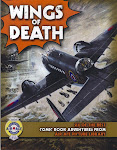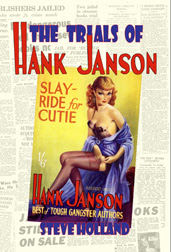Eagle: The Space Age Comic
Steve Winders reviews the Radio Four programme about the famous Eagle comic, broadcast on December 23rd.
The problem for an enthusiast in reviewing new works about Eagle is that they rarely contain any new information. This is especially true of radio and television programmes and is to be expected. After all Eagle began sixty years ago and in its original incarnation ended forty one years ago. All the key information which programmes are obliged to feature is well known. Consequently many new works now seem tedious to fans who have heard it all before, where a casual listener who recalls the comic fondly from his childhood may find it riveting.
Historians encounter this problem all the time and of course Eagle is now history. They endeavour to make their work interesting by including eye witness accounts of events and by drawing their own conclusions from the information to try to provide new insights into historical figures and events. On radio and television these are most successful when they can interview living witnesses and of course as a children's comic Eagle still has many living witnesses of its influence if not of its production. Eagle: The Space Age Comic was well served by the comments and recollections of Sally Morris, the daughter of Eagle's creator Marcus Morris, who is also co-author of his excellent biography Living With Eagles, the author and fan Philip Pullman and the long time fan and Eagle exhibition organiser David Britton. The programme was presented by another fan, Sir Tim Rice, who was also able to contribute his own recollections and enthusiasm. Unlike some previous programmes it used only contributors who knew a lot about Eagle and why it was successful. Philip Pullman, for example conveyed most effectively the joy of the physical engagement that a weekly comic delivered through your letter box brought.
Eagle: The Space Age Comic avoided the feared boredom by skilful editing. Individual contributions were broken up into short segments, so no one featured for too long at any one time. Their comments were clear and incisive and conveyed effectively the story of Eagle, its quality and the enthusiasm it generated. Although most of its main contributors are now dead there were nevertheless short well chosen extracts from past interviews with Marcus Morris and Frank Hampson, the creator of Eagle's leading strip 'Dan Dare'. The hugely popular and well illustrated 'Dan Dare' strip was instrumental in Eagle's success and along with the story of how the comic was created was prominently featured in the programme.
Several short extracts from 'Dan Dare' adventures were slipped in between the contributor's comments and the programme took the unusual step of having them read by a young boy. While the boy needed more help with what must have been a most unfamiliar text – he referred to Sir Hubert Guest as Sir Herbert on all three occasions that he mentioned his name and mispronounced the name of Dan's famous arch enemy the Mekon – this idea was a more successful approach than that adopted by several previous radio programmes of having professional actors performing extracts very badly.
The programme also mentioned the famous cutaway drawings that adorned the top of centre pages of Eagle and Sally Morris commented on the interest shown in them by the Ministry of Defence, who were concerned that Eagle's technical artist Leslie Ashwell-Wood might innocently correctly guess some secret aspect of a new aircraft or ship and give away too much information to rival foreign powers. Unfortunately other strips in Eagle were mentioned only briefly if at all, although Frank Bellamy's excellent work on 'Heros the Spartan' was singled out for particular praise. The new Eagle of 1982–1994 was dismissed with the phrase “...but things weren't the same,” which seems unfair, given its comparatively successful run at a time when interest in children's comics had declined significantly. However the programme was really devoted to the original and to its lead strip 'Dan Dare' and to try to fit too much into its half an hour running time would have damaged the message.
Mercifully the programme did not try to emulate the historians and provide any new insights into the story of Eagle. It told the familiar story in an interesting and lively manner, punctuating comments and extracts with suitable music and sparing use of sound effects. It delivered the simple message that Eagle was a comic of the highest quality which presented a positive and exciting world.
Eagle: The Space Age Comic is still available on the BBC iPlayer until Thursday 30 December.





















































No comments:
Post a Comment